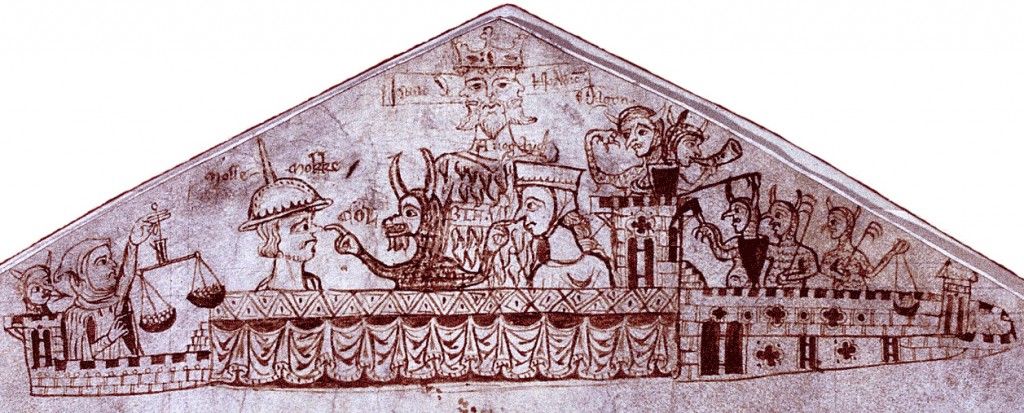Life in the Shadow of the Mob: Jewish Norwich July 29, 2015
Author: Beach Combing | in : Medieval , trackbackThe recent post on the bodies in the well from Norwich took Beach through several books on medieval Jewish communities in England and the dominant impression on reading these accounts was the danger of being Jewish in that period. Let’s return to Norwich which included one of Britain’s bigger Jewish communities after London: one estimate has been made for 200 individuals. Medieval population estimates are always to be taken with a pinch of salt, of course, but medieval Norwich itself had just 10000 to 20000 citizens. The suspicion is that the Jewish community would not have been noticed had it not been for medieval Christianity’s obsession with ‘Jewry’; and the documented role that Norwich Jews took in money lending (something made possible by Christianity’s insane laws on usury). On the second point the image above includes a three-faced Jewish money lender (on high) from the city, Isaac fil Jurnet, by all accounts one of the richest Jews in England, and a man whose family had settled in Norwich; remarkably Isaac married a Christian wife but brought up his daughter Jewish. The history of the Jewish community in the city is difficult to trace. There is probably a Jew, Isaac of Hurford, near Norwich in Domesday Book in 1086, but the first real evidence for a community within the city walls dates to the 1130s. In 1290 all English Jews were driven from British shores by a royal order. Between 1130 and 1290, there were a hundred a fifty years of persecution. Here is Norfolk’s record of anti-semitism.
1144, a young boy named William, a skinner, went missing and when his body was found it was alleged that he had been ritually killed by the Jewish population. There is no evidence of anti-Jewish violence associated directly with this case, but it will not have helped intercommunal relations that William, probably the victim of a gentile sex crime, was made into a martyr by the local Church.
1190, pogroms erupted across England and reached Norwich 6 Feb 1190. The Jews fled for the protection of the castle: those who were left behind in their quarter were killed. The wording of the medieval chronicle could be taken to mean that most of the Jews in the community were killed.
1200, an affray took place between one Abraham of Norwich and a priest, which led to a court case.
1230 the Jewish community was accused of kidnapping and circumcising a Christian boy, Odard son of Benedict. Benedict may have been a convert, which would explain the background to the kidnapping (if it really happened).
1235 Attack on the Jewish quarter.
1237 Attack on the Jewish quarter.
1240 Four Jews dragged through the city and then hung for the 1230 kidnapping.
This is a litany of horror and the possible background for the seventeen bodies found in a Norwich well (on which some expert emails were sent in, click and scroll down). Imagine being born in 1144 to a Jewish mother and belonging to a community of about two hundred souls. These points above were just the documented attacks on the community, most are attested only once and by chance. This likely means that there were others as well: ranging from shouted insults, to black eyes, to bloody murder. In many cases we cannot know what an attack meant. For example, did no or did fifty Jews die in the pogroms of 1235? Were they carried out by half a dozen drunk butchers or by five hundred rabid city-dwellers? Remember too that even the four men executed in 1240 represented close to five percent of the male Jewish population. If (big if) the seventeen bodies in the well were really Jewish that was about ten percent of the community! In the modern world minorities are noticed when they slip past about ten percent: some sociologists have even spoken of the ten-percent rule. The nice thing about being ten percent of the population is that you are in company and you can, to some extent, protect yourselves. All the evidence above, slight as it is, suggests a much smaller group that depended on the grace of the king’s agents in the castle (which was not always forthcoming) and the absolutely unattested goodwill of the Christian community that surrounded them: these were men, women and children who went to mass on Sunday and as well as hearing of the ‘perfidy of the Jews’ had their own martyr William to fan the embers of hate. Some reading the list above will feel horror, some fear, Beach feels, honestly, claustrophobia, the claustrophobia of the small child who has nowhere else to run. What was the chance that a Jew from Norwich 1130-1290 would be killed by violence: 1%, 5%, 20%…? No wonder a poet from the community, Meir of Norwich, our earliest Jewish voice from England, wrote in one of his few surviving poems: ‘In the land of the heavy-hearted and exhausted / we have heard the people’s reproach /Silently we await the light.’
Other thoughts on Jewish life in the shadow of the mob: drbeachcombing AT yahoo DOT com



